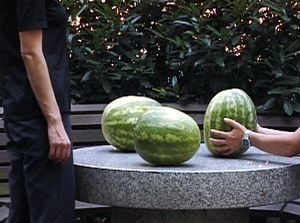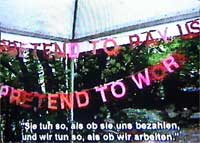Wettbewerb Dokumentarfilm
Regie:Paulina Baudry, Brigitta Kuster, Renate Lorenz
86 Min, Bulgarien/D 2004

Copy Me - I Want to Travel
Acud, Di, 31.07.113235 um 00:00 Uhr
babylon berlin:mitte, So, 31.03.113280 um 00:00 Uhr

Die Kopie, von der der Film erzählt, wurde in Bulgarien produziert: in den 80er Jahren demontierte man dort das Westprodukt Apple-II und setzte es als Ostprodukt Pravetz-82 neu zusammen. Das reverse engineering eines erfolgreichen Personal Computers, die Kopie als Einsatz im Kalten Krieg. Inoffiziell eine Kopie, offiziell eine eigene bulgarische Produktion. Wie jede Kopie verfehlte auch diese ihr Original.

Etwas eigenes entstand in Bulgarien und produzierte kollektive Wünsche: ein Erfolgsprodukt sollte es sein, ein Massenprodukt, mit dem das kleine Land Bulgarien mit den USA gleichzog. Dem Westen sollte dieser Rechner ein Schnippchen schlagen, mit seiner Hilfe wollte man sich über diejenigen lustig machen, „die nicht einmal wissen, wo Bulgarien liegt“.
Frauen nahmen bei der Produktion dieser Kopie eine besondere Rolle ein. Viele arbeiteten in hohen Positionen und balancierten „drei Wassermelonen unter einem Arm“: Offiziell waren Frauen gleichgestellt, inoffiziell sagte man im sozialistischen Bulgarien, „Frauen tragen drei Wassermelonen unter einem Arm. Sie sollen eine gute Aktivistin, eine gute Hausfrau und Mutter und eine gute Lohnarbeiterin sein“.
Später, am Übergang vom Sozialismus zum Kapitalismus, wurde der Rechner auch zum Instrument für die Produktion von Computerviren. Einmal gemacht, kopierten sich die Viren selbst und sie reisten: „Die USA können mich an der Einreise hindern, aber nicht meine Viren“, so Dark Avenger, eine VirenschreiberIn, deren Produkte in Unternehmen der USA besonders hohe Schäden anrichteten.
Doch die kollektiven Wünsche wurden auch abgebogen, blieben stecken. Die Produktion kopierte die Produktionsweise des westlichen Kapitalismus, die VirenschreiberInnen galten als Looser und als welche „ohne Sinn für Eigentum“. Viele Computerkids wurden zu Programmiererinnen und Hardwarespezialistinnen, die schlecht verdienen bei wenigen noch existierenden bulgarischen Firmen und gut oder besser, wenn sie bei einer us-amerikanischen oder deutschen Firma arbeiten. Viele der Frauen, die wir suchten, haben bereits das Land verlassen und leben mit Arbeitsvisa in den USA, in Kanada oder in Südafrika.

Gemeinsam, drei Filmemacherinnen und drei Computerspezialistinnen unternahmen wir diese Recherche durch die Geschichte der bulgarischen Computerproduktion. Der Film erzählt sie in Gesprächen mit Plamen Vachkov, dem ehemaligen Generaldirektor der Pravetz Fabrik, mit Doriana Moneva, die die Leiterplattenproduktion in Pravetz einrichtete und Maschinen im westlichen Ausland einkaufte, mit Maria Petrova, die Arbeiterin im Pravetz Werk war und Proteste wegen ausstehender Löhne anleitete oder mit Vesselin Bontchev, dem „Virusjäger“, dem grössten Gegenspieler Dark Avengers. copy me - i want to travel zeigt zudem seltenes Footage über die Einführung der Personal Computer in Bulgarien.

Etwas eigenes entstand in Bulgarien und produzierte kollektive Wünsche: ein Erfolgsprodukt sollte es sein, ein Massenprodukt, mit dem das kleine Land Bulgarien mit den USA gleichzog. Dem Westen sollte dieser Rechner ein Schnippchen schlagen, mit seiner Hilfe wollte man sich über diejenigen lustig machen, „die nicht einmal wissen, wo Bulgarien liegt“.
Frauen nahmen bei der Produktion dieser Kopie eine besondere Rolle ein. Viele arbeiteten in hohen Positionen und balancierten „drei Wassermelonen unter einem Arm“: Offiziell waren Frauen gleichgestellt, inoffiziell sagte man im sozialistischen Bulgarien, „Frauen tragen drei Wassermelonen unter einem Arm. Sie sollen eine gute Aktivistin, eine gute Hausfrau und Mutter und eine gute Lohnarbeiterin sein“.
Später, am Übergang vom Sozialismus zum Kapitalismus, wurde der Rechner auch zum Instrument für die Produktion von Computerviren. Einmal gemacht, kopierten sich die Viren selbst und sie reisten: „Die USA können mich an der Einreise hindern, aber nicht meine Viren“, so Dark Avenger, eine VirenschreiberIn, deren Produkte in Unternehmen der USA besonders hohe Schäden anrichteten.
Doch die kollektiven Wünsche wurden auch abgebogen, blieben stecken. Die Produktion kopierte die Produktionsweise des westlichen Kapitalismus, die VirenschreiberInnen galten als Looser und als welche „ohne Sinn für Eigentum“. Viele Computerkids wurden zu Programmiererinnen und Hardwarespezialistinnen, die schlecht verdienen bei wenigen noch existierenden bulgarischen Firmen und gut oder besser, wenn sie bei einer us-amerikanischen oder deutschen Firma arbeiten. Viele der Frauen, die wir suchten, haben bereits das Land verlassen und leben mit Arbeitsvisa in den USA, in Kanada oder in Südafrika.

Gemeinsam, drei Filmemacherinnen und drei Computerspezialistinnen unternahmen wir diese Recherche durch die Geschichte der bulgarischen Computerproduktion. Der Film erzählt sie in Gesprächen mit Plamen Vachkov, dem ehemaligen Generaldirektor der Pravetz Fabrik, mit Doriana Moneva, die die Leiterplattenproduktion in Pravetz einrichtete und Maschinen im westlichen Ausland einkaufte, mit Maria Petrova, die Arbeiterin im Pravetz Werk war und Proteste wegen ausstehender Löhne anleitete oder mit Vesselin Bontchev, dem „Virusjäger“, dem grössten Gegenspieler Dark Avengers. copy me - i want to travel zeigt zudem seltenes Footage über die Einführung der Personal Computer in Bulgarien.
Dass die Sicht der Filmemacherinnen kritisch gegenüber den Bildern des Kalten Krieges und dennoch darin verfangen ist, dass sie ihre eigenen Geschlechter- und sexuellen Positionen im Gepäck haben, werfen inszenierte Images auf, die wie eine queere Version klassischer Spionagefilme den Film durchziehen: Pauline Boudrys Familie kam aus Bulgarien in die Schweiz, - der erste Kinofilm, den Pauline mit ihrer Familie sah, hiess „le parapluie bulgare“. Er handelte vom präparierten Regenschirm eines bulgarischen Agenten.
Die Musik für den Film produzierte die Band „rhythm king and her friends“.
copy me - i want to travel
renate lorenz medien produktion .
wrangelstrasse 54 .
D 10997 berlin .
030.61627551 .
renatelorenz@snafu.de
English synopsis: The copy of which the film is talking about was produced in Bulgaria: in the eighties the Western product Apple-II was dismantled there and put together again as the Eastern product Pravetz II. The reverse engineering of a successful personal computer, the copy comes into operation in the Cold War. Unofficially it is a copy; officially it is a Bulgarian production. As every copy it fails its original.
Die Musik für den Film produzierte die Band „rhythm king and her friends“.
copy me - i want to travel
renate lorenz medien produktion .
wrangelstrasse 54 .
D 10997 berlin .
030.61627551 .
renatelorenz@snafu.de
English synopsis: The copy of which the film is talking about was produced in Bulgaria: in the eighties the Western product Apple-II was dismantled there and put together again as the Eastern product Pravetz II. The reverse engineering of a successful personal computer, the copy comes into operation in the Cold War. Unofficially it is a copy; officially it is a Bulgarian production. As every copy it fails its original.
Something particular was created in Bulgaria and produced collective desires: it was supposed to be a successful product, a mass product, which would help the small country Bulgaria catch up to the USA. The computer was supposed to outsmart the West and with its help one wanted to make fun of those, „who don’t even know where Bulgaria is.”
In the production of the copy women took on a special role. Many of them working in high positions and carrying „three watermelons under one arm”: officially women were enjoying equal rights, but unofficially one would say said in socialist Bulgaria, „Woman carry three watermelons under one arm. They are supposed to be a good activist, a good housewife and a good worker.”
Later, during the transition from socialism to capitalism, the computer was also used for the production of viruses. Once made, the viruses copied themselves and traveled: „The USA can deny entry to me, but not to my viruses”, said Dark Avenger, a virus writer whose products caused major damage in companies in the USA.
But collective desires were also deflected, got stuck. The production copied the way of production of Western capitalism; the virus writers were considered losers without an „understanding of property”. Many of the computer kids became women programmers and hardware specialists, who earn little at the few existing Bulgarian companies and earn well or better, if they work for an American or German company. Many of the women we were searching for already left the country and live with working permits in the USA, in Canada or in South Africa.
Together, three women filmmakers and three women computer specialists, we take a research trip through the history of bulgarian Computer production. The film tells his story through conversations with Plamen Vachkov, the former managing director of the Pravetz factory, with Doriana Moneva, who installed the printed circuit board at Pravetz and Maria Petrova, who was a worker at the Pravetz plant and who organised protests for owed wages, or with Vesselin Bontchev, the virus hunter, the biggest opponent of Dark Avenger. copy me - i want to travel also shows rare footage on the introduction of personal computers in Bulgaria.
The fact that the filmmaker‘s view of the images of the cold war is critical and yet caught up in them, and that they carry with them their own gender and sexual positions brings about staged images that infuse the film like a queer version of classic spy films: Pauline Boudrys family came from Bulgaria to Switzerland and the first movie Pauline saw with them was called „le parapluie bulgare“. It was about the tricked out umbrella of a bulgarian agent.
The music for the film was produced by rhythm king and her friends.
